Nature of Reality, Will the Real YHWH Please Step Forward, 14) Marble Idols and Other Greeks
El Cid
I was walking with my spouse through the park, and in the park was a statue that has been there unmoving, inanimate, and so un-alive but representing a dead person, that is a real person who had died long ago. The statue represents the hero of Spain's war against the Moors, Rodrigo Diaz de Bivar, known as El Cid Campeador, the Master Challenger.
The horse on which he sat, sword raised, has one foot up and is in full prance. This indicates that the person died in battle. If the horse has all feet on the ground, the person depicted dies, as it were, with his boot off, or at peace from other causes. Rodrigo Diaz was alive and moving and changing, acting, animatedly doing things he believed in until he died. He was replaced by an inanimate statue of dead metal on a rock base and now, his statue is more or less unchanging and inanimate, i.e. not alive.
Cairo Museum, Mummies and other dead things


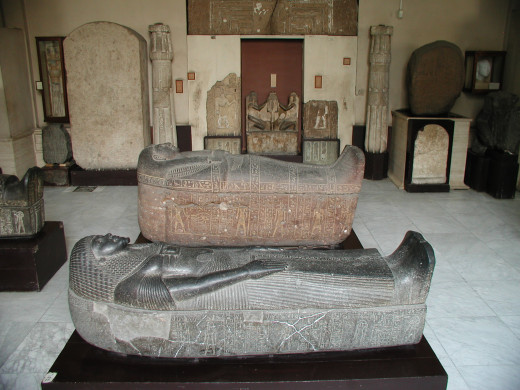
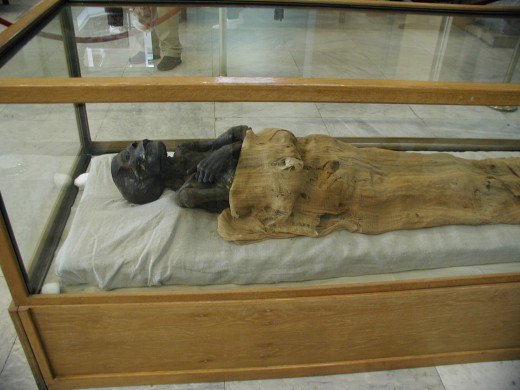
Mummies
Behind me in the museum were mummies, people where were at one time animate, alive, moving changing beings that died and, through one process or another, their bodies were preserved, unmoving for millennia. Of course, they did not die there, they were moved there by other animate beings, people.
We humans have a problem in trying to find out what YHWH is like, since we cannot directly sense YHWH, that is without him making himself known to us in this realm in which we live as distinct from the realm in which he lives.
This is the problem with naturalistic science also, that is, naturalistic physical sciences that restrict themselves to knowing only what can be sensed, and repeatedly tested. Our senses tell us things about this realm or domain, but nothing at all about the domain YHWH exists in.
Our senses are useless in discovering God except in the fine details of reasoning as to why something can, or must be the way it is, much as the Intelligent Design people are now doing, in other words, no other explanation works because there are no examples of highly specified information being produced without intelligence, but there are many cases of it being produced by intelligence.
But this leads us only to the fact that there is necessarily a God, or at a minimum a being superior to us that can create, and gives little information as to what he is like, at least on a personal level.
If we cannot sense him, how do we or how can we know details about him?
Mysticisms
Here is a problem with mysticisms that claim direct knowledge of God: They all produce different and unintelligible results. This produced a subjective god as opposed to the objective God of reality, of the Bible.
What do I mean by “subjective?”
If I want to know something about an object I can test that to see what its qualities are, it is an object, and not me, I am the subject. Let’s say I have tasted a grape and like the taste but do not know anything about them. I can either make up something I would like to be true about them, say, that are all sweet and weigh 30 pounds, or I can go and see the objects themselves finding that thirty pound worth would be thousands of grapes. That is objectivity, finding out what the object is actually like verses my subjective idea, because I want the grape to be large so I can make things out of them and eat a lot of them.
But how do we objectively observe different classes of objects and beings? This is a problem of knowledge, that is, how do we come to know?
If I want to know something about the earth itself, that is, say geology, or other earth science, I can directly test it to uncover the details. It does nothing, it is passive, I do everything. If you do the identical test you will get the identical result, because it is testable, and because you are testing an object, that is something objective, outside of yourself.
This is also true of plants, but the tests are more detailed because the plant is alive and changing. The tests might involve the soils they grow in, the amount of light they receive, the amount of nutrient they needs, or, the function of a specific enzyme or the gene that produces that enzyme, the rate of growth under differing environmental influences, and so forth, but still, completely objective tests can produce real answers.
If I want to know about an animal, I can observe the animal, do most of the work myself, but that doesn’t tell me everything, I need to interact with him to see how he interacts with humans because now we have something with some kind of mind or mental function, something with fears, desires, experiences that shape those experiences, and so forth. Each can be quite different. So now we have more subjectivity involved in the gathering of information needed to really understand this animal, and the next animal of the same breed may differ in some learned areas and that learning changes the animal significantly which can be seen in the term “runt of the littler.” Experiences when it was young affected the animals hormones and it did not grow as strong as the largest and most dominant of the same litter.
The Rabbit from Hell
My mother wanted a really cute rabbit and bought a little hybrid only to return it because it was obnoxious. It would not sit in her lap, or allow itself to be petted. We wanted a rabbit my kids could play with so we bought a “New Zealand White” rabbit that was so passive it would walk up to complete strangers. The term is in quotes because that breed is actually from Mexico not New Zealand.
Humans
If I want to know about a human body I can study a corpse to find out a lot, but not everything because with the mind or soul gone, you simply cannot find out the half of what humans are really like by the study of the corps. Of course, you cannot test how the living human body acts or functions while they are dead either.
If I want to know about the soul, that is, a person, now it is a fifty-fifty venture, we each need to ask questions, and interact on a different and personal level to really understand the person separate from the animal.
There is necessarily a huge amount of subjectivity in the testing, thus we have psychology, psychiatry, physiology, philosophy, etc., etc., etc. I need to find the personality, the skill sets, the past familial history and how they responded to unfortunate events, and to good events, whether they believe in God, and so forth, which is psychology, and their brain chemistry and function, psychology, and what they think about things, their philosophy, and so forth and so on.
This is tremendously difficult and an ongoing study.
But if I want to understand a being that is above, or superior to my testing ability, to my sensing abilities, and one I can’t personally interact with, that is, a supernatural being I need to be, I must be the recipient of all the information from that being, whether an angelic being or God himself.
The roles are reversed. He has to reveal himself to me because there is not a thing I can do to know him directly of my own initiative.
The Artwork of John Neill




Fiddler On The Roof
Think of my favorite play/moving, Fiddler on the Roof with Tevia walking along talking to God, but God doesn’t verbally answer back.
So, God has to choose to use a communication method available to him but not to me, that is, for the vast majority of us, he speaks through the scriptures.
That is what religion tries but fails to do, to find God. But this has produced notably bad results in the past as varied as Islam, Mormonism, Jehovah’s Witnesses, Wicca, Hinduism, and Baptists (my apologies to Baptists, which includes most of my family and friends and where I have spent the majority of my life).
But subjective views of God abound. The theme seems to be exactly what the Greeks did, make up whatever you like and then claim if God isn’t the way you describe him, then he can’t be God.
We cannot sense God by definition because he is above nature which is that which he created, he is in a different domain, he is above nature (supernatural), and if we settle for what we make up in our minds, or the minds of Greek speculative philosophers, then as the old song says, “anything goes,” and it too often has.
Artist, Art, Artistic, Artifice, Artificial, Artisan, Artificer
This would be like an oil painting I created trying to understand me. It doesn’t work that way, nothing does, ergo, this simply will not do if we are to know the God who is really there, an objective being having certain characteristics and lacking others. God is limited to a certain number of characteristics which he has, and the antithesis are characteristics he does not have.
Yes, we all limit God, as he himself does when he is described because saying one things about him necessarily excludes other things, that is how antithesis works.
We need to wait until he reveals himself to us. If we are waiting for him to reveal himself to us (not individually, he doesn’t act that way very often, literally a handful of times in the last 10,000 years or so), then believing what he says is not religion, rather it is believing the truth. It is God telling us what he is like, the very opposite of religion, which is man seeking God.
Do you understand the difference? It is the direction of the information flow.
We cannot simply think up things and determine the facts about an objective being that is beyond our sensory and cognitive powers, again, he must reveal himself to us, but take heart, he did.
All too often we revert to our own understanding of what we want God to be like and impose that on the Bible, the very reason we have thousands of denominations. We want the grape to weigh thirty pounds, not one tenth of an ounce. But again, God must reveal himself to us or our descriptions won’t be true.
A Story
Allow me relate a story.
I have an unusual yard. I love tropical plants and have a great display to the point that people actually stop and come to the yard, or to the house to ask about various plant.
Saturday last, a very nice and very Catholic lady stopped by and we have a wonderful conversation for several hours that started with plants and ended with God.
By the way, I am protestant.
Being very Catholic she defended the Catholic position without any suggestions or resistance from me, that is, she started that conversation and could say what she wanted. I did not offer and counter argument, I just wanted to listen, and listen I did.
Listening is better than talking because you are learning when you listen, but not when you are talking.
Her basic premise was the question of why should she listen to a young upstart religious leader or a new religion (and by this she meant protestants, and so forth) when she could go to her church and hear what thousands of well-trained scholars have concluded to be true over a two thousand year period.
Her point was well taken, a body of developed knowledge should be taken seriously.
What if they were wrong?
What I didn’t ask was: “What if they are wrong?”
The argument this lady presented was a form of an argument titled argumentum ab annis, and appeal to time, in this case, she inferred that the doctrines were true or it is right because they are old.
Before I go farther, an argument, idea, church, or doctrine is not true of false because it is old or young. Time has nothing to do with the correctness of anything. This is a logical fallacy.
Another fallacy that she was making was consensus gentium or an appeal to a select group, or clan, which is by far the most frequent fallacy found in churches about subjects related to doctrine, it claims in brief, “or side is correct” or, “our teachers came to the correct conclusion.” Some might be thinking that this is argumentum ad populum or an appeal to the number of people who believe it, but this is not properly applied to churches since there are so many different church beliefs, rather, this is the fallacy that occurs at election time.
At any given point along that long path someone could (I will argue along with many, many other religious, that the Roman Church did) make a mistake or many mistakes that have resulted in more than a thousand years of error. If it was wrong 1000 years ago, is it right because it is old?
She was, however, wrong in saying her church was 2000 years old. The Roman church is about 1700 years old, more or less, the church as the body of Christ, i.e. all saved people is just about to turn 2000 in about 21 years (at this writing in 2013), but they have nearly always intentionally obscured those two facts to their own purposes. They decided actually centuries later that they were a continuation from Peter and that Jesus’ statement about building the church on the rock was not himself as the rock, but was Peter, which means a little stone, and that they decided they had an unbroken chain of Popes starting with Peter and continuing from there, God love them.
We Christians believe the original Bible is correct, the original written text (though we disagree on the cannon), and the original faith, and this is why, hundreds of years after they were formed by Constantine about 380 A.D. but later and later, claims to earlier and earlier foundations were overlaid on this history in an attempt to lay claim that this particular church was formed by Christ himself in his statement to Peter.
So errors abound in man’s attempt to know God and/or to control some group of believers, and those methods used can be political, economic, threats of violence, and so forth, in other words, quite human.
What if one of those errors injected into your belief system was incorporated from a polytheistic religious group, a confederated group of states with groups of philosophers, some from other states and countries, that were trying, without Biblical help, without any direct revelation from the gods they believed in, to determine what the head of their pantheon of gods was like? (This is made harder in that none of them are or were alive. None of them were in time.)
Would that be OK to simply mix in ideas from other religions?
Like the Biblical account their understanding was that the earth was formed after some kind of disorder. The Bible claims the first matter was disorganized, the Greeks called this chaos, but out of their chaos came Mother Earth, or Gaea and soon united with Tartarus to produce Typhoeus and then Eros, and so on and so forth. Nearly anyone who had an imagination could create a god and throw it into the marketplace of ideas to see if it would stick and many did.
YHWH, The God of the Bible
The God of the Bible, being all powerful, organized and having a plan simply restructured what he had created like a potter throws down clay, and then makes it into something useful.
Remember Paul on Mars Hill, the Areopogas, a marble hill in Athens next to the Acropolis where the ancients in the first century even left a space open for any gods they might have missed which Paul said had the title “To an Unknown God.”
There were so many Greek gods they came in sets as well as singular gods, both nice gods and unkind gods, there were the superior gods, Gaea and Uranus, then the main gods, Atlas and Prometheus, then the Titan couples Cronus and Rhea, Coeus and Phoebe, Hyperiuon and Theia, Oceanus and Tethys, and others such as Crius and Iapetus, Mnemosyne and Themis. We then move to the Olympian gods, Aphrodite, Apollo, Ares, Artemis, Athena, Demeter, Dionysus, Hades, Hephaestus, Hera, Hermes, Hestia, Poseidon, and Zeus. We will leave off without naming the Semi-gods, spirits, monsters, and Greek Heroes.
Gaea and Uranus were the main gods but were they the top gods, or was there someone or something above them? (Zeus would eventually be elevated into that position.)
That was troubling Greek Speculative Philosophers, the gods were all too human, so they had a problem. They changed the formula for making Greek gods and determined they were as unlike humans as you can possibly make them and then they tried to determine which of these make up unhuman like gods was the best.
This is an odd question unless, like Lewis and Tolkien you were writing a fantastic fantasy where you know everything was make believe. They had already made up the pantheon of gods now they wanted to know what the Ultimate Being was like the top god of the gods, so they made up other things. Again, Lewis and Tolkien did, but they knew, as did everyone else that they were writing fantasy.
Made up gods
These are made up gods. This was a priori theology (no one had seen of, in their nation, heard from God), and later this would result in a priori exegesis of the Biblical text. That is, our seminaries would teach what is acceptable to think about god and what is not before looking at the evidence (a priori), and then read the Bible into that set of beliefs.
This is what I mean about a religion, they were trying to figure out the gods without the gods revealing themselves to them. It doesn’t work out very well, but they went forward and they started to develop criteria for what the best of the best of the gods must be like, this Ultimate Being.
Long before that, the God of the Bible had been making himself known to the Israelites through direct revelation, the proper channel for understanding God, and he was very different, as you have already seen.
These ideas about the Ultimate Being were a huge conglomeration of Greek conjuring and thinking over hundreds of years of debate on the subjects, and, without revelation from the gods, despite the fact that they made up the god Hermes, the messenger from the gods (god of boundaries and borders, etc.), this was all a fairy tale story. Hermes, it turns out, couldn’t really deliver a message from the gods because he didn’t exist either.
The Indictment
This made up model of the Greek gods worked its way into Christian doctrine.
Christianity itself, that is, the core belief, the pure doctrine is not a conglomeration of ideas collected from other religions, but other religions have both in the past and currently unduly influenced what people think and many of those things have been woven into the fabric of all denominations.
Yes, this is an indictment against Christianity in general for putting denominational beliefs before the simple truth of the Bible. But no, I am not starting a new religion or denomination not do I encourage anyone else to, we have way too many now.
Let’s correct our thinking instead of moving forward with it, let’s reform it from the inside this time. This is a new reformation. Unlike the old one, let’s start and end with sola scriptura.
Luther’s original goal was not to start new denominations, but this wasn’t the first time nor would it be the last that splinter groups broke off the Roman church. In fact, the Presbyterians broke off later.
For restatement and brevity, let me create a massively multi-text paraphrase here, but the thinking went something like this, over a period of ten or so decades:
Art in Stone at The Getty Villa



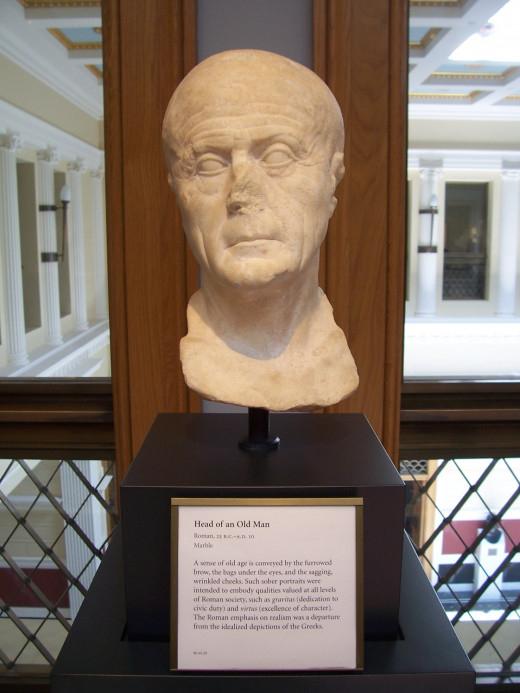
Describe the Greek Ultimate Being
The Ultimate Being, or top dog of the pantheon of hundreds of lesser gods must:
1) Be perfect. Well, we don’t really know what that is, but let’s make something up about what “perfect” means. Perfect means to us (them) something without anything that could possibly be considered in any manner whatsoever to be weak or flawed or vulnerable, etc., etc., so, he must be a perfect being like that. We will determine what is perfect, i.e. he must meet up to our standard. Jesus would not have made the grade since he could die, he bled, wept, etc.
2) He must be housed in a perfectly shaped container, and, since everyone knows that only perfect spheres are perfect containers, he must be inside a sphere, or he can’t be the ultimate being, he just wouldn’t fit our idea of perfection. Again, Jesus wouldn’t fit the bill, he was not so housed. (This is where the Catholics were burned by Galileo because they used the Greek idea of the universe being a group of concentric spheres surrounding the earth. Opps.)
3) He must be in the perfect position because if it were not then he would not be perfect (by our standards) and therefore could not be the ultimate being. What is that perfect position, you ask, I don’t know, they didn’t know, but they were sure there was one and this top god must be in it or he can’t be the perfect being. Why they didn’t simply make up the position they thought was perfect, I don’t know, they made up all the other standards they applied. They made up this being that even Jesus couldn’t be because Jesus moved and kept changing positions by moving around the country side, and changed size from an fetus to newborn, to a teen, then to adult size, i.e. Jesus changed dramatically exactly as we do, by growing up, “And Jesus increased in wisdom and stature, and in favor with God and man” (Luke 2: 52), which the Greeks didn’t like either.
4) If the ultimate being was, and must of necessity be in a perfect position, he could never have been out of that position, because that would mean he wasn’t perfect. In fact, he cannot move out of that position because he would cease to be perfect, so there he sits, or stands, or lays, unable to move because he cannot by threat of losing his position as the ultimate being of the pantheon of gods.
5) Since he does not need to move, and since movement is the change of position over time, viola! he doesn’t need time! Thus the ultimate being, the top dog of hundreds of gods of the polytheism became the “unmoved mover.” Not only does he not move, he cannot move, i.e. he cannot change because to do so would be to cease being the ultimate being, so he cannot move, or, for that matter change in any other manner whatsoever.
Ok, but what do we call a person who cannot move? They described a rock statue.
Defining Inanimate, The Getty Marcus Aurelius
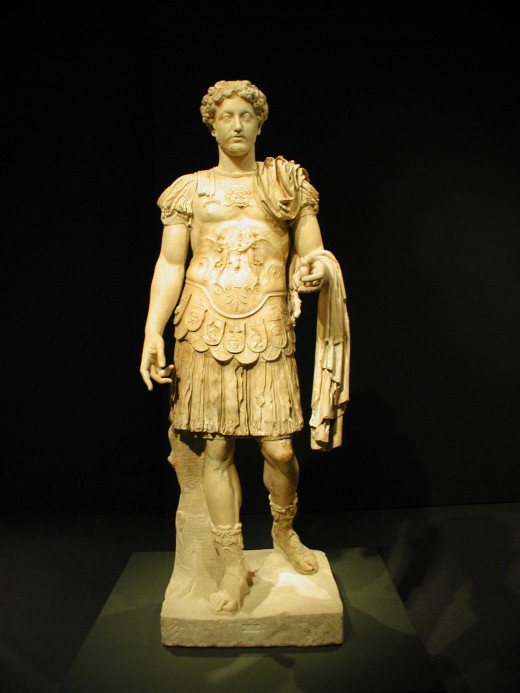
Inanimate = Dead
Things that cannot move, are, by definition, inanimate. The Greek philosophers described an inanimate object devoid of all things personal.
There are a variety of things we call inanimate objects. We might call them a statue. Michelangelo’s David has never moved, but he has been moved, he is made of marble which, like this ultimate being, cannot move, or be moved, so, he is like a marble idol, and cannot move on his own, but unlike a marble statue in that a marble sculptures can be moved. Above I used Lincoln for that same purpose.
We might call beings that cannot move “paralyzed.” If there is a problem with their nervous system and cannot move, or a problem with the musculoskeletal system. I have had friends and family, some quite recently, that stopped moving, i.e. they died. So we call people who used to be animated then stopped animating “dead.”
My kids lying in bed in the morning we tease by telling them they look like they are dead. Why? Because everyone else in the house, living things all, are all moving but that one person who is, for all intents and purposes, unmoved.
In fact, so integral with life is moving that moving is one way we identify things as being alive, they are called “animate” beings, moving, the opposite of this inanimate being they conjured up in Greece.
Remember Mary Shelly’s book The Modern Prometheus, renamed Frankenstein’s Monster, what did Dr. Frankenstein say when he realized his experiment with body parts worked, that is, the monster moved, this is was now animate? He said: “It’s alive!”
Animistic religions worship anything that moves, partly because they recognize that it is different from the extreme majority of things in the universe and world which do not move.
A human, now torpid, If in 'Jersey this is a "stiff"
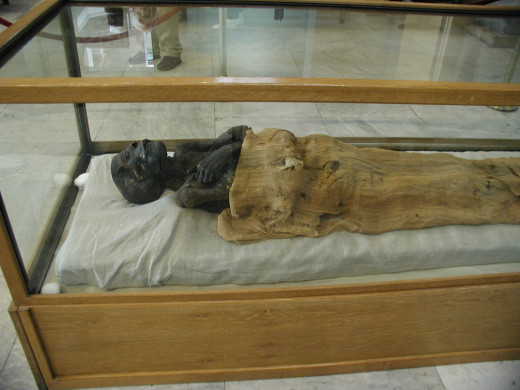
The Torpid god
“Torpid” would be another word we could legitimately apply since he is inactive. The root word, “torp” means stiff, and this certainly applies to this being so described, he is a stiff (Hello New Jersey!).
“Indolent” is another we could apply, because he shows the disposition of being inactive. The very word “inactive” itself is a good word, and implies being without energy. Energy is needed for movement, but if you are not going to move, then inactive is an applicable word. You are doing nothing at all.
“Passive” and “sedentary” are other words that would apply.
So, the ultimate being was paralyzed, and torpid, inactive, and passive, sedentary and inanimate. As previously stated, the word means “not moving” but the word also directly implies “not alive,” or “dead.” In fact, in the New Testament the word translated “live” or “alive” is Zao, and is also translated as “active” or “full of vigor.” This is not moving Greek god, Zeus really, is not the God of the Bible. It is the antithesis of YHWH.
Here is a mental exercise: Think of any statue you have or know of, any you have seen. Could you apply the words “active” or “alive” or “full of vigor” to those statuary?
No? Why? Because the statue is inanimate, but that is how the Greeks decided their ultimate being was.
All this from the people who decided some 2300 years ago, prior to Lucretius, that the cosmos was a perfect sphere and unchanging three hundred years after Isaiah told us it was anisotropic (not the same in all directions) that is spread out but relatively flat, like a tent of that time, but being stretched, and so changing. Isaiah was right, the Greeks where flat wrong. So, why are we listening to them?
Redefinition
Words have interrelated meanings for a reason. You cannot simply jettison the meaning of words and redefine them that way you like. Redefinition philosophy failed miserably because it would have required a complete rewiring of the human mind to do so and no intelligent being below God can do that, and he isn’t going to do that to suit the demands of atheists. That is insanity.
Let’s turn that point about not moving around and point the words in the opposite direction. We had a pet hamster for our kids. It stopped moving. Did we put it back in its cage and claim it is a god because it was no longer moving? No, we proclaimed it was dead and put it into the ground. Unlike this ultimate inanimate being, it changed from being a pet to being fertilizer.
It’s Greek to me
So the Greek philosophers decided what perfection means and then crammed the top god in their pantheon of god into that definition and virtually make him inanimate, but, unlike himself, animated everything else, then demanded you accept their variety of Ultimate Being, i.e. god as the unmoved mover. They set the standard then decided it was so good, the top god must be just like that or they were going to strip him of his title. “If he is not like this, then he is not god.”
How human of them. They set the standard they wanted then defined god by that standard and verbally prevented disagreement with that standard.
He could not move or change in any manner whatsoever. Nothing that can be described as changing could be applicable to him because, according to them, if there were to be any change, the ultimate being would lose his position in their pantheon of gods.
Augustine
Not to worry, we didn’t want the Greeks to feel all alone in their made up religion, so, along comes Augustine (see his quote below), schooled in Greek thought (specifically Neoplatonism) and back to the church he goes (he was a “backslider”) bringing in this very same doctrine from the Greek pantheon into the Christian religion. (This is another oversimplification that suits my current literary need.)
Did you ever wonder where the “God is dead” movement came from? It came partly from the belief that God does not interact with the world, he cannot move, and, again, we call things that don’t move “dead.” In every way we determine things that move are alive and things that do not move are dead.
I am taking some liberty here, since the “God is dead” movement came first from naturalism, and then from not seeing him work around us, but that is because he set up nature in such a manner that it rarely needs intervention, i.e. “miracles” and so, his hand is rarely seen, but this is similar, both are a lack of activity, however, this theology helped fuel the movement.
Now, I love Greek food and music and dance, and even love reading Greek philosophy, but why would you think they could, without revelation from God determine what he was like? This is against the basic doctrines of all Christian churches, that is to mix in false religious doctrines into your theology. However, the two major divisions of theology have done exactly that.
Speculation or Revelation?
The premise of Christianity is that since we cannot see God and cannot simply imagine everything he is and correctly guess that, we need revelation from him explaining what he is like. God is not a figment of our imagination, he is a real, objective being and some things are true about him and others are false. We don’t know what is true and what is not unless and until he reveals himself to us.
What do we see when we read the Bible? More precisely for now, do we see this Greek idea that God does not move or act in time?
Categorically, no, he repeatedly acts in time, as we have seen. He created the world in six different units of time called days, and interacts with man throughout history. That is the definition of being in time, acting at different times which can be measured (in this case, on different days). Read your Bible. But the Catholic Church liked the idea and enhanced the idea repeatedly over the centuries.
Well, it seems there is a lot of baggage the Catholic Church has been dragging around for 2000 years, and so, when that dear lady stopped by and we discussed her disdain for “new religions” because her Catholic Church was 2000 years old, my dear lady, there is a reason not to listen to embedded doctrines of the church that have been developed, ruminated, and discussed for 2000 years when they have been found to be in error.
They were wrong.
Eastern Orthodox
The Eastern Orthodox Church left over the idea that the Pope is perfect and speaks for God. (Yes, they actually believe that, but not unusual since there are people in my church who believe they are prophets, ergo, they speak to God and God speaks back.)
Other small church groups left the Roman Church over similar issues, so, we in the western European area threw a little party called The Reformation for the same reason and because the RC church had turned into a political beast.
The church didn’t like all the noise at the party so instead of joining the reform movement, they started to kill people, and the reformers, go figure, fought back. Back and forth we went for a few hundred years, with less people killed that were killed in three days at Gettysburg, but still, not good.
But lo and behold, out the other end comes Protestantism in all of its hundreds of various forms, and, it is dragging around that same old piece of luggage we picked up when we visited Athens!
Don’t take my sarcasm wrongly, I am a protestant also.
Many times I have been in theological conversations where a person confronted with a different view of God but unable to defend their view will try in desperation a statement such as “Well, if that was true, then God wouldn’t be God.” (On the left shoulder, I am imaging a little guy in a white Greek toga saying, “Yeah, we invented that!”)
These rather humorous attempts to win by invoking absoluteness to their arguments of their understanding of God causes me to wonder how many different views of God there are in the world and how the views, ideas, understandings, definitions of God (“theology”) has changed over time to what you or what I might believe today.
Sola Scriptura
Let me be clear: The Bible is true. God is there, he is real, and yes, he created the physical universe.
I want to clear away that ambiguity here because you might get the idea that I do not believe the Bible and nothing could be further from the truth, for out of the Reformation came one of the most profound two word statements that exists in theology today: “Sola Scriptura.”
This is a categorical rejection of the idea that since it is old, it is true, or, just because he was appointed to be the Bishop of Rome, doesn’t make a man infallible in anything. They have had both very good and very bad men in that post, and are we to think that the bad corrupt popes were also infallible?
Let’s dispatch that idea.
So what would it be that makes them infallible? A puff of white smoke? I mean no disrespect, the last several popes have been fantastic guys, but perfect, even in matters of faith because a bunch of guys in red voted for them to lead their church?
I think not. (Apologies to Descartes.
© 2015 Ronald A Newcomb






